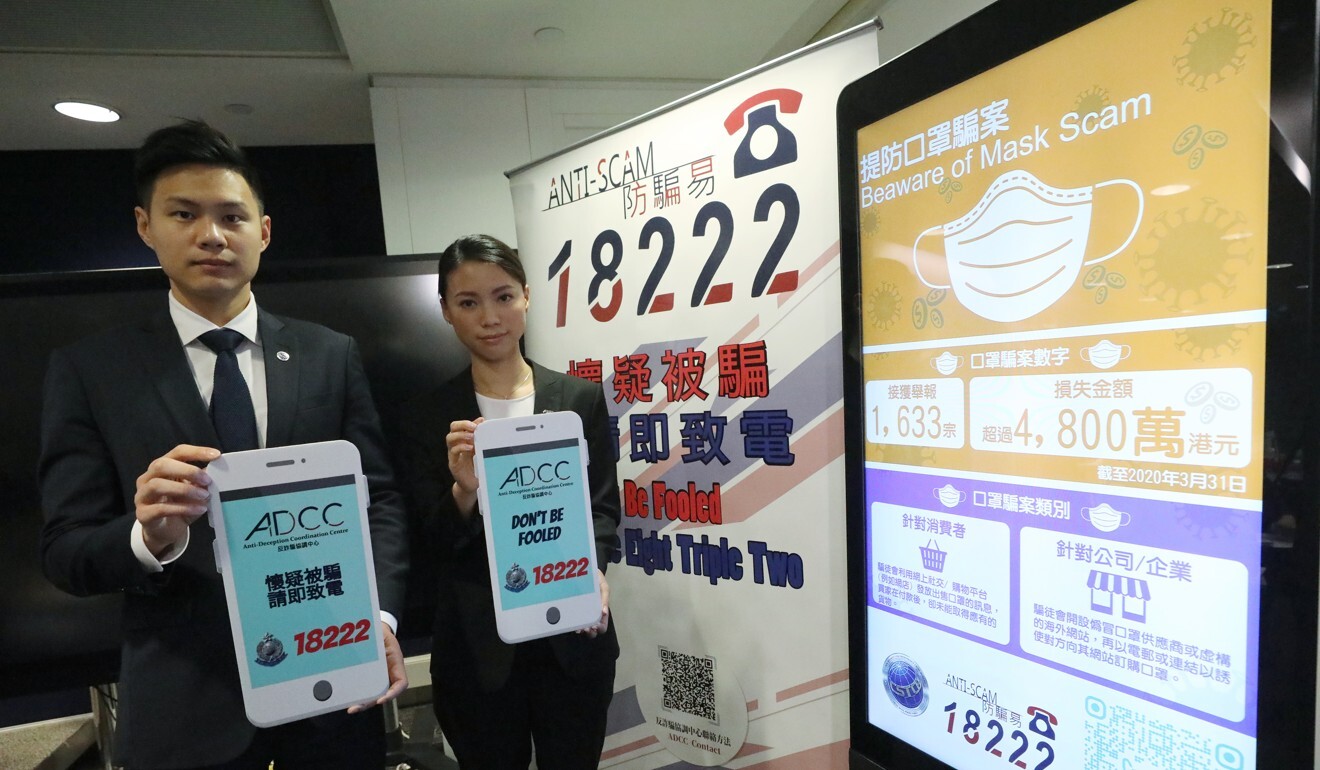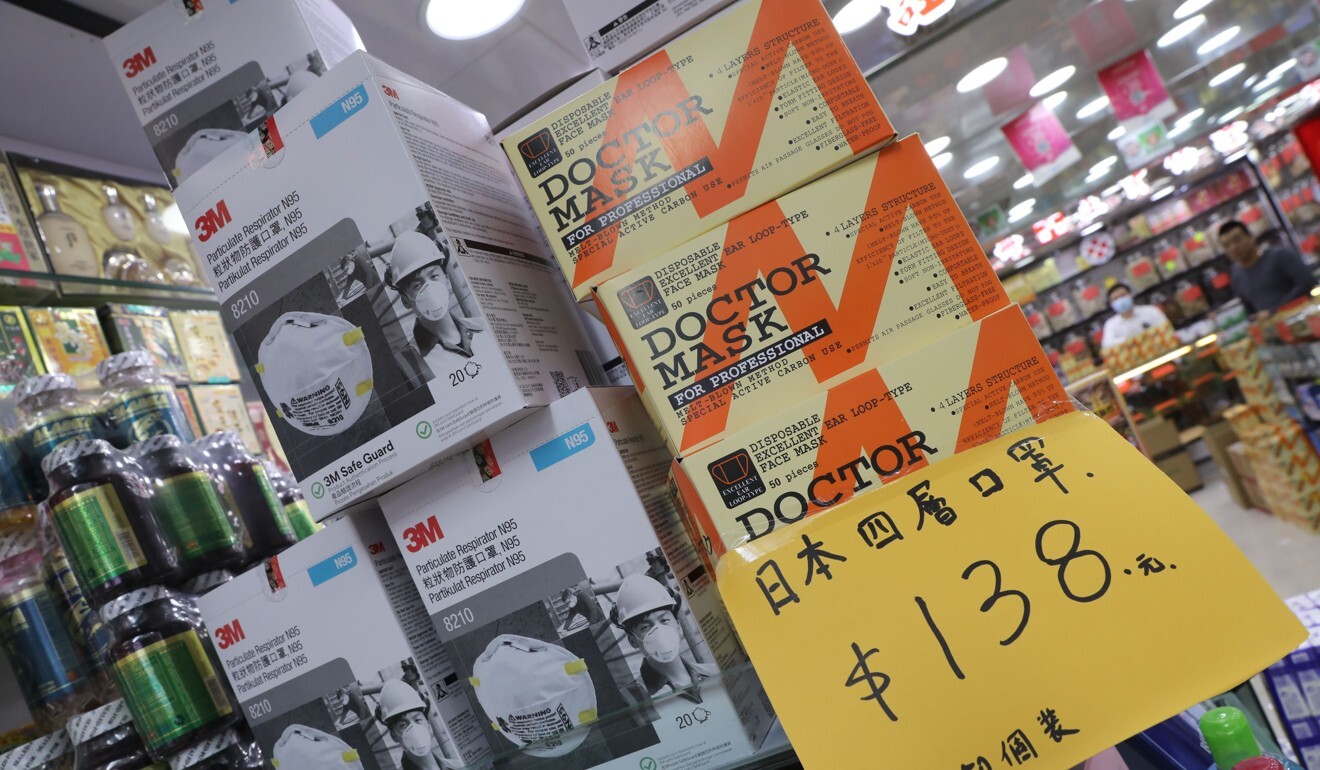
Coronavirus: con artists swindle thousands of Hongkongers in face mask scams totalling HK$48 million
- Local firm was hardest hit after international fraudsters conned it out of HK$20 million (US$2.6 million)
- More than 3,000 victims in the city over first three months of this year
Coronavirus con artists scammed a Hong Kong clinic out of HK$20 million (US$2.6 million) in a surgical mask fraud, police have revealed.
The clinic was just one of more than 3,000 victims in the city who were caught up in online scams, which resulted in crooks swindling people out of over HK$48 million (US$6.2 million) in the first three months of this year.
A local firm that runs a clinic in the city was hardest hit, after international fraudsters posing as a face mask supplier in Europe deceived the firm in February into transferring HK$20 million into 14 bank accounts in the United States, Portugal, Spain, the Netherlands, Germany, Poland and Turkey.
In an unprecedented operation to track down the stolen money, Hong Kong police recovered HK$15 million in cooperation with overseas law enforcement agencies, according to Senior Inspector Yonny Yeung Yung, of the Anti-Deception Coordination Centre.
The victims realised they had been conned when they never received any ordered goods and the sellers could not be contacted
Some of the cash had been transferred to a bank account in France, but was also intercepted, one police source said. The remaining HK$5 million was pocketed by swindlers.
The company fell victim to the scam after it left an online post along with its email address, hunting for epidemic prevention supplies in early February.
Yeung said fraudsters contacted the company via email, and it placed orders for several types of mask as well as some protective suits.
The firm transferred the money into the bank accounts in seven countries over the course of several days, but a doctor realised it was a scam when he lost contact with the so-called supplier. He then reported the incident to police.

In total, Hong Kong police received 1,633 reports of online mask scams between January and March, Senior Inspector Ken Lee Lap-man of the cybersecurity and technology crime bureau said.
Lee said those cases consisted of more than 3,000 individual victims and local companies, involving a total of HK$48.2 million. The victims were aged from 13 to 69, and included students and housewives, as well as white-collar and blue-collar workers.
Officers had arrested 39 people – 27 men and 12 women – aged between 14 and 58 in connection with more than 120 cases. Police said most of them worked alone.
Lee said scammers offered to sell surgical masks on online social or shopping platforms to find individual victims.
Con artists usually asked buyers to pay in advance and then invented different excuses to delay delivery, so they had more time to cheat more people, he said.

To hide their identities, police said, some fraudsters even made good use of the social-distancing laws and rejected face-to-face transactions, and might also use friends’ bank accounts to collect money.
“The victims realised they had been conned when they never received any ordered goods and the sellers could not be contacted,” Lee said.
To target local companies, swindlers posed as popular face mask manufacturers or overseas face mask suppliers. They used bogus websites and emails displaying names and addresses similar to the genuine suppliers, to fool victims.
Reports of online mask scams contributed to a sharp surge in the number of online commercial frauds, including shopping fraud, this year.
South Koreans turn up at polling booths in face masks as virus cases fall
Police handled 1,460 reports of online commercial fraud in the first two months of 2020, up 251 per cent from 415 in the same period last year.
To combat online mask scams, the force has set up a task force to pool resources, gather intelligence, formulate strategies, and organise investigations.
Police have also enhanced publicity and education campaigns to raise public awareness of the crime.
Yeung said swindlers “took advantage of Hongkongers’ desperation for surgical masks”, and reminded the public to stay alert while shopping online.
In February, a box of 50 was sold for as much as HK$500 in the city, with residents desperately hunting for supplies amid the outbreak of the coronavirus.
Before placing an order, police urged online shoppers to research the credibility of an online store and shop at stores with a good reputation.
Even DIY face masks ‘better than nothing’ to combat virus, experts say
Police also warned the public that some telephone con artists had exploited the Covid-19 pandemic and changed their tactics by impersonating Department of Health workers to find victims.
Victims were told there were some anomalies regarding their health, and that their bank accounts had been used in online face mask scams so they were placed under restrictions for entering and leaving the city.
As instructed, victims transferred money into designated bank accounts as a surety during the “investigation”, or scammers asked for their names, Hong Kong identity card numbers, and online banking details to steal their money.
Yeung said eight people had been cheated out of a total of HK$6.2 million using these tactics recently. The latest case was reported to police on April 2, involving HK$3.25 million.
“Fraudsters even posed as mainland public security officers to meet victims in person in three of the cases,” she said.
She said phone scammers pocketed about HK$110 million by tricking victims into revealing their online banking details such as login name and password in 2019. Telephone con artists bagged HK$150 million in total last year.
The senior inspector urged the public not to disclose their personal information and bank details to others.
“If in doubt, please call the Anti-Scam Helpline 18222 for advice,” she said.

